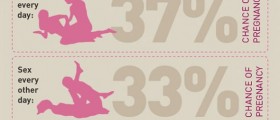
Unfortunately, it seems that today most people do not get enough sleep. Medical science is well aware of the importance of sleeping, but the statistics still show that only a small percentage of people spend the right amount of time sleeping.
How much sleep do we need?
The general rule of thumb is that eight hours of sleep is the amount of time that everyone should spend sleeping. This, of course, only applies on uninterrupted sleep. Sleeping for five hours, then spending several hours awake and sleeping three more hours is not considered quality sleep.
Many people simply do not have time to sleep eight hours a night, and for them the quality of sleep is more important. Some can even sleep six hours or less and still feel refreshed and energized in the morning. Others can sleep for more than ten hours and feel lousy the whole day.
The amount of the sleep required depends on the age. Babies need 16 hours of sleep per day, toddlers between ten and 12 and children, until they reach the teen years, should sleep between nine and 11 hours per night.
As for the adults, it all depends but the amount of sleep should vary between six and ten hours.
Sleep deprivation
Those who sleep less than what they are supposed to, given their age, physical and psychological constitution, health and other issues, are at risk of suffering from sleep deprivation. Sleep deprivation is a serious, and unfortunately, common problem. It also leads to other problems and situations, such as car accidents with fatalities. It is believed that sleep deprivation was one of the reasons behind the great catastrophes such as Chernobyl, Three Mile Island and Exxon Valdez oil spill.
In addition, scientists believe that many health problems can be reduced or alleviated simply by getting enough sleep. This applies to obesity, diabetes and depression.
It is also important to understand that not every sleep is the same. In order to be refreshing, sleep must have all the stages it is supposed to. Incomplete sleep is a problem just as serious as sleep deprivation.
Stages of sleep
Each stage of sleep has its benefits and impacts on various functions of the body and the mind.
Stage one, which lasts for ten to 15 minutes, is the stage of drowsiness, during which the body begins to relax. In the stage two, or the light sleep, the eye movement stops, heart starts beating slower and the temperature slightly drops.
Stages three and four are the stages of deep sleep. During this stage, the body releases hormones which repair the cells in the body.
Stage five is the so-called REM sleep and it occurs in cycles during the last five or six hours of an average eight-hour sleep. The cycles last about 20 minutes and can occur up to six times per night. In this stage the eye movement increases, as well as the heart rate. It is during this stage that people have dreams.

















Your thoughts on this
Loading...